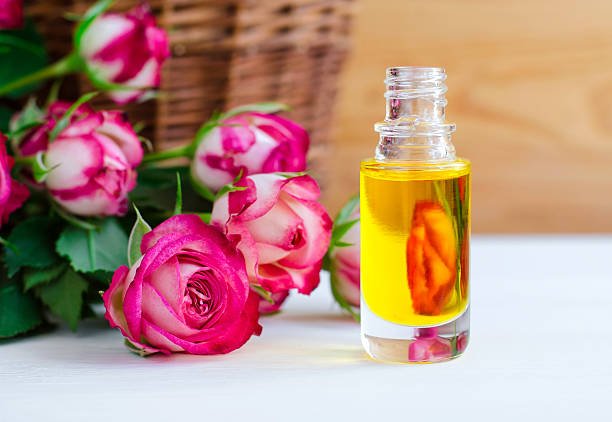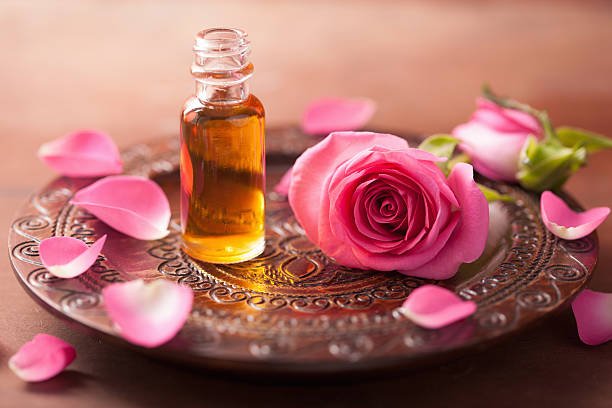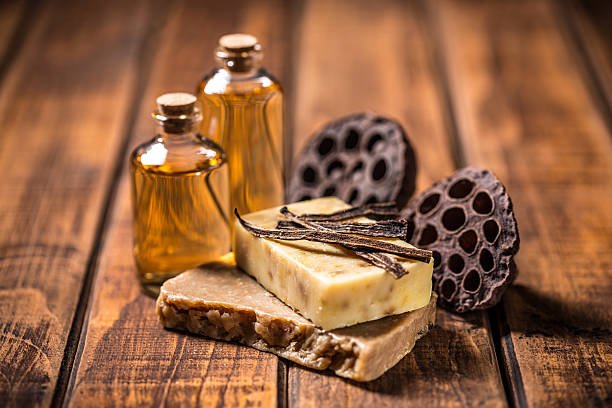ROSE OIL :-
Poets and lovers have long extolled the virtues of the rose, but this flower is more than just a pretty array of fragrant petals.
According to research, the essential oil derived from the rose plant has a wide range of potential benefits. Although a lot of the research to date has been based on small trials, some clear physiological and psychological benefits have emerged.
In this article we’ll take a closer look at what we’ve learned so far about what rose oil may have the ability to do, and how to use it.

What are the benefits of rose oil?
Eases pain
In a 2015 Study Trusted Source , postoperative children inhaled either almond oil or rose oil. The patients in the group that inhaled rose oil reported a significant decrease in their pain levels. Researchers think the rose oil may have stimulated the brain to release endorphins, often called the “feel-good” hormone.
Based on the outcome of this study, the researchers suggested that aromatherapy using rose oil could be an effective way to ease pain in patients who’ve had surgery.
Relief from menstrual discomfort
In a study conducted in 2013, patients with menstrual pain received abdominal massages to relieve their discomfort.
One group was massaged with a carrier oil (almond oil) only, while the other group was massaged with almond oil plus rose oil. The rose oil group reported having less cramping pain following the massage than the almond oil group did.
Decreases anxiety and stress
Rose oil has a relaxing effect on many people.
In one Study Trusted Source, researchers applied rose oil to the skin of each participant, and then measured its effects on the most common symptoms of anxiety. Blood pressure, heart rates, breathing rates, cortisol levels, and blood oxygen levels all decreased. The subjects also reported feeling much more relaxed after the oil treatment.
Another Study Trusted Source involving over 100 women who were giving birth found that rose oil lowered their anxiety levels during delivery.
Antibacterial, antifungal properties
Researchers have found that essential oil distilled from roses can be effective against a wide range of microbes that cause infections. This includes E-coil as well as some strains of the bacteria that can cause staph infections (Staphylococcus) and strep throat (Streptococcus).
Additionally, the study found that rose oil was effective against Candida albicans, which can cause fungal infections in the mouth, gut, and vagina.
Stimulates sex drive
Two studies have found that inhaling rose oil increased sexual desire and sexual satisfaction among men and, to a lesser extent, women. One Study Trusted Source involved male participants with a major depressive disorder who were taking antidepressants, and the other Study Trusted Source involved female participants with the same disorder and also on antidepressants.
Researchers believe that the release of dopamine in the brain, a known motivator, may be what spurs the increase in sexual desire, while simultaneously alleviating symptoms of depression.
How to use rose oil
Rose oil is usually quite expensive and is highly potent. It should be diluted whether you plan to inhale it or use it on your skin.
- To make a rose oil bath, add 10 drops of rose essential oil to a carrier oil, then add to a warm tub. Essential oils should always be diluted in a carrier oil before adding to water.
- To make a foot bath, add a few drops of diluted rose oil into the foot bath and soak your feet for 10 minutes.
- To treat anxiety, stress, or depression, you can either inhale rose oil using a diffuser or dab it lightly on your chest, neck, and wrists. Be sure to blend it with a carrier oil first like coconut, almond, or jojoba oil before it touches the skin. You may also benefit from a rose oil massage, in which the rose essential oil is added to a carrier massage oil.
Before using any alternative or complementary treatment, talk to your doctor about any current medical conditions, possible drug interactions, or side effects.








